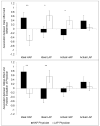Patients respond more positively to physicians who focus on their ideal affect
- PMID: 25313670
- PMCID: PMC4395515
- DOI: 10.1037/emo0000026
Patients respond more positively to physicians who focus on their ideal affect
Abstract
Previous findings suggest that patients choose physicians whose affective focus matches how they ideally want to feel (Sims et al., 2014). For instance, the more people wanted to feel excitement, the more likely they were to hypothetically choose a new physician who promoted excitement. What remains unknown is whether this match shapes how patients actually respond to physicians after being assigned to them (i.e., whether they adhere to physicians' recommendations more and evaluate physicians more positively). To this end, community adults reported their global ideal affect and actual affect (how they ideally want to feel and actually feel during a typical week, respectively), and were randomly assigned to receive health recommendations from either a physician who expressed and promoted high arousal positive states (HAP) (e.g., excitement), or one who expressed and promoted low arousal positive states (LAP) (e.g., calm). For the next 5 days, participants reported their daily adherence to the recommendations and their daily ideal and actual affect. At the end of the week, participants evaluated their physician. As predicted, the more participants wanted to feel HAP, the more they adhered to the "HAP-focused" physician's recommendations, and the more participants wanted to feel LAP, the more they adhered to the "LAP-focused" physician's recommendations. Participants also evaluated their physician more positively when his affective focus matched their ideal affect. Neither global nor daily actual affect systematically predicted how patients responded to their physicians. These findings suggest that patients respond better to physicians whose affective focus matches their ideal affect.
(c) 2015 APA, all rights reserved).
Figures



References
-
- Aaker JL, Lee AY. “I” Seek Pleasures and “We” Avoid Pains: The Role of Self-Regulatory Goals in Information Processing and Persuasion. Journal of Consumer Research. 2001;28(1):33–49. doi: 10.1086/321946.
-
- Agrawal N, Menon G, Aaker JL. Getting emotional about health. Journal of Marketing Research. 2007;44(1):100–113.
-
- Aiken LS, West SG. Multiple regression: Testing and interpreting interactions. Sage Publications, Inc; Thousand Oaks, CA, US: 1991.
-
- Ajzen I. Perceived Behavioral Control, Self-Efficacy, Locus of Control, and the Theory of Planned Behavior1. Journal of Applied Social Psychology. 2002;32(4):665–683. doi: 10.1111/j.1559-1816.2002.tb00236.x.
-
- Ambady N, Koo J, Rosenthal R, Winograd CH. Physical therapists’ nonverbal communication predicts geriatric patients’ health outcomes. Psychology and Aging. 2002;17(3):443–452. doi: 10.1037/0882-7974.17.3.443. - PubMed
Publication types
MeSH terms
Grants and funding
LinkOut - more resources
Full Text Sources
Other Literature Sources
Research Materials

